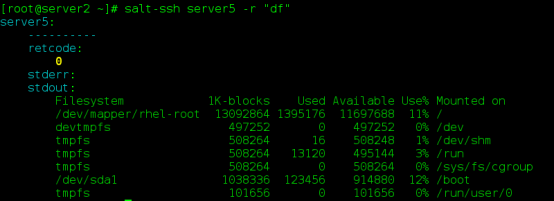1. Preface
saltstack is divided into master and slave, which can be used for cluster management
2. Environment
Serr2:172.25.69.2 (main)
Serr3:172.25.69.3 (from)
Serr4:172.25.69.4 (from)
3. Environmental settings
Main: Install saltstack-master, python-setproctitle.x86_64
From: Install salt-minion.noarch
Master: Open the service salt-master
From: Modify the location file / etc/salt/minion
master: 172.25.69.2
Open the service salt-minion
Main: salt-key-L
Salt-key-A adds all keys
Salt-key-D deletes all keys
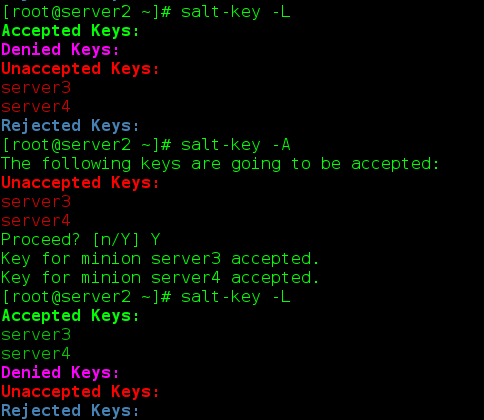
Test Connection

4. Installing Apache for Nodes
(1) Modify the main node configuration file
/etc/salt/master
file_roots:
base:
- /srv/salt/(2) Create apache directory in / srv/salt

(3) Write install.sls file
install-apache:
pkg.installed: #Default yum installation
- pkgs:
- httpd
file.managed:
- name: /etc/httpd/conf/httpd.conf #Target file
- source: salt://apache/files/httpd.conf source file
service.running: #When a service starts, a reload is a reload
- name: httpd
- reload: true
- watch:
- file: install-apache
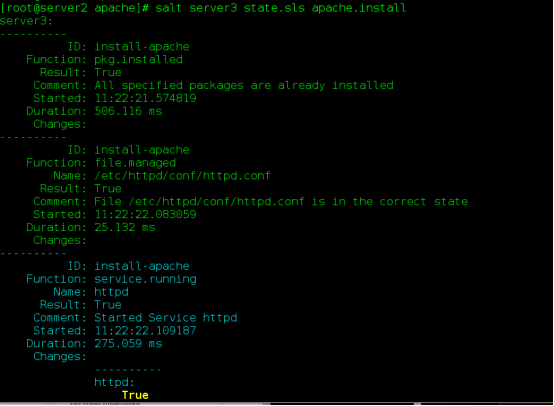
5. Install Nginx for nodes
(1) Create nginx directory and pkgs directory in / srv/salt
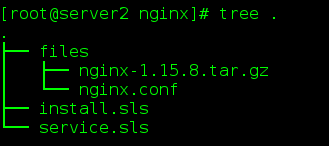

(2) sls files in nginx directory
#####install.sls
include:
- pkgs.install
install-nginx:
file.managed:
- name: /mnt/nginx-1.15.8.tar.gz
- source: salt://nginx/files/nginx-1.15.8.tar.gz
cmd.run:
- name: cd /mnt && tar zxf nginx-1.15.8.tar.gz && cd nginx-1.15.8 && sed -i 's/CFLAGS="$CFLAGS -g"/#CFLAGS="$CFLAGS -g"/g' auto/cc/gcc && ./configure --prefix=/usr/local/nginx && make && make install
- creates: /usr/local/nginx
######service.sls
include:
- nginx.install
/usr/local/nginx/sbin/nginx:
cmd.run:
- creates: /usr/local/nginx/logs/nginx.pid
/usr/local/nginx/conf/nginx.conf:
file.managed:
- source: salt://nginx/files/nginx.conf
/usr/local/nginx/sbin/nginx -s reload:
cmd.wait:
- watch:
- file: /usr/local/nginx/conf/nginx.conf(3) sls files in pkgs directory
pkgs-install.sls
nginx-make:
pkg.installed:
- pkgs:
- gcc
- make
- zlib-devel
- pcre-devel(4) Install and start nginx
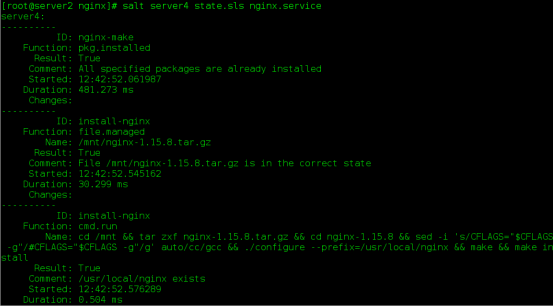
(5) Settings modification using system D to manage nginx
Write nginx.service file in files directory under nginx directory
[Unit] Description=The NGINX HTTP and reverse proxy server After=syslog.target network.target remote-fs.target nss-lookup.target [Service] Type=forking PIDFile=/usr/local/nginx/logs/nginx.pid ExecStartPre=/usr/local/nginx/sbin/nginx -t ExecStart=/usr/local/nginx/sbin/nginx ExecReload=/usr/local/nginx/sbin/nginx -s reload ExecStop=/bin/kill -s QUIT $MAINPID PrivateTmp=true [Install] WantedBy=multi-user.target
Modify the service.sls file to
include:
- nginx.install
/usr/local/nginx/conf/nginx.conf:
file.managed:
- source: salt://nginx/files/nginx.conf
service-nginx:
file.managed:
- name: /usr/lib/systemd/system/nginx.service
- source: salt://nginx/files/nginx.service
service.running:
- name: nginx
- reload: True
- watch:
- file: /usr/local/nginx/conf/nginx.conf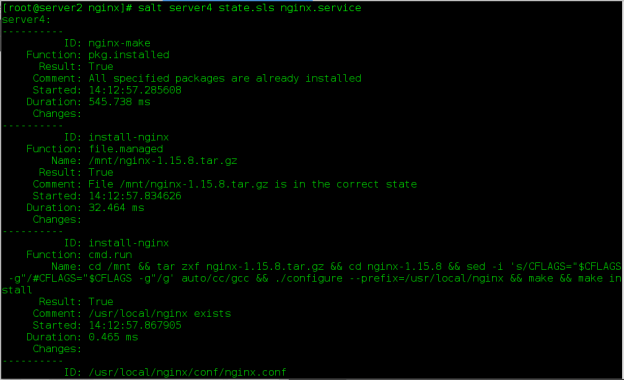

6. Viewing and setting variables


(1) Variable setting method 1:
Server 3 minion configuration file
grains:
roles:
- apacheminion configuration file for server 4
grains:
roles:
- nginx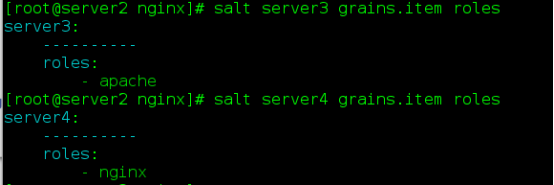
(2) Variable setting method 2:
Create a grain file in the / etc/salt directory
roles:
- nginx
(3) Variable setting method 3:
my_grains.py
def my_grains():
grains = {}
grains['hello'] = 'world'
grains['salt'] = 'stack'
return grainsSending Policy
Command: salt server 3 saltutil. sync_grains


(4) Variable setting method 4:
Modify the main node configuration file / etc/salt/master
pillar_roots:
base:
- /srv/pillarCreate directories
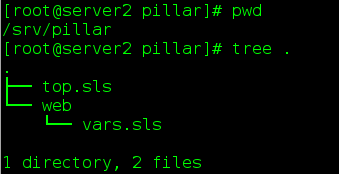
top.sls
base:
'*':
- web.varsvars.sls
{% if grains['fqdn'] == 'server3' %}
webserver: httpd
ip: 172.25.0.3
{% elif grains['fqdn'] == 'server4' %}
webserver: nginx
ip: 172.25.0.4
{% endif %}wipe cache

Synchronize variable files and view variables

7. Installing keepalived to achieve high availability
(1) Environment
server3: 172.25.69.3(apache,keepalived(master))
server4: 172.25.69.4(nginx,keepalived(backup))
Implementing effect: Local host accesses keepalived virtual ip first by accessing server 3. When server 3 fails to shut down abnormally, virtual ip drifts to server 4.
(1)apache
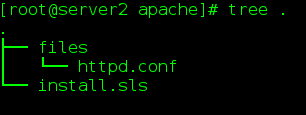
install.sls
install-apache:
pkg.installed:
- pkgs:
- httpd
file.managed:
- name: /etc/httpd/conf/httpd.conf
- source: salt://apache/files/httpd.conf
- template: jinja
- context:
port: 80
service.running:
- name: httpd
- reload: true
- watch:
- file: install-apache(2)nginx
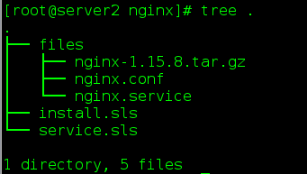
Configuration as above
(3)keepalived
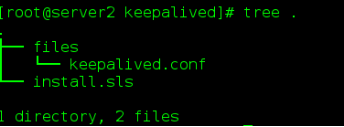
install.sls
install-keepalived:
pkg.installed:
- pkgs:
- keepalived
file.managed:
- name: /etc/keepalived/keepalived.conf
- source: salt://keepalived/files/keepalived.conf
- template: jinja
- context:
STATE: {{ pillar['state'] }}
VRID: {{ pillar['vrid'] }}
PRIORITY: {{ pillar['priority'] }}
service.running:
- name: keepalived
- watch:
- file: install-keepalivedkeepalived.conf
! Configuration File for keepalived
global_defs {
notification_email {
root@localhost
}
notification_email_from keepalived@localhost
smtp_server 127.0.0.1
smtp_connect_timeout 30
router_id LVS_DEVEL
}
vrrp_instance VI_1 {
state {{ STATE }}
interface eth0
virtual_router_id {{ VRID }}
priority {{ PRIORITY }}
advert_int 1
authentication {
auth_type PASS
auth_pass 1111
}
virtual_ipaddress {
172.25.69.69
}
}(4) Variables
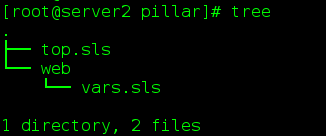
top.sls
base:
'*':
- web.varsvar.sls
{% if grains['fqdn'] == 'server3' %}
ip: 172.25.0.3
state: MASTER
vrid: 100
priority: 100
{% elif grains['fqdn'] == 'server4' %}
ip: 172.25.0.4
state: BACKUP
vrid: 100
priority: 50
{% endif %}(5) Overall

Command: salt'*'state. high state
(6) Final results

When keepalived of server 3 closes, vip will be transferred to server 4
8,topmaster syndic+master minion
(1) Environment
server2(syndic+master)
server3(minion)
server4(minion)
server5(topmaster)
Serr2: Install salt-syndic,salt-master
Serr3 installation: salt-minion
Serr4 installation: salt-minion
Serr5 installation: salt-master
(2) Setting up configuration files
Modify server 2 master configuration file
syndic_master: server5
Modify server 5 master configuration file
order_masters: True
Serr2 opens server-master
server-syndic
Serr5 opens server-master
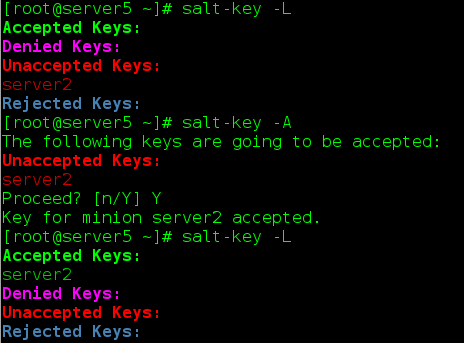


9,salt-ssh
(1) Preparation
Server 3 closes salt-minion
Serr2 Edit / etc/salt/roster, add
server3:
host: 172.25.69.3
user: root
passwd: redhat
(2) Installing salt-ssh
Serr2 installation
(3) Testing

11,salt-api
(1) Preparation
Serr2 installs salt-api
Generate the key. / etc/pki/tls/private/

Generate certificates
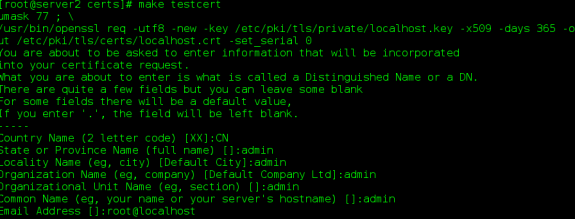
(2) Create user saltapi and set password
(3) Modifying configuration files
/etc/salt/master.d/
[root@server2 master.d]# cat api.conf
rest_cherrypy:
port: 8000
ssl_crt: /etc/pki/tls/certs/localhost.crt
ssl_key: /etc/pki/tls/private/localhost.key
[root@server2 master.d]# cat auth.conf
external_auth:
pam:
saltapi:
- .*
- '@wheel'
- '@runner'
- '@jobs'(4) Testing
Command: curl-sSk https://localhost:8000/login-H'Accept: application/x-yaml'-d username=saltapi-d password=redhat-d eauth=pam

Command: curl-sSk https://localhost:8000-H'Accept: application/x-yaml'-H'X-Auth-Token: ff6fe100de92eceed 205812a88e49cb0b47799e9'-d client=local-d tgt='*-d fun=test.

saltapi.py
Provided by github
# -*- coding: utf-8 -*-
import urllib2,urllib
import time
try:
import json
except ImportError:
import simplejson as json
class SaltAPI(object):
__token_id = ''
def __init__(self,url,username,password):
self.__url = url.rstrip('/')
self.__user = username
self.__password = password
def token_id(self):
''' user login and get token id '''
params = {'eauth': 'pam', 'username': self.__user, 'password': self.__password}
encode = urllib.urlencode(params)
obj = urllib.unquote(encode)
content = self.postRequest(obj,prefix='/login')
try:
self.__token_id = content['return'][0]['token']
except KeyError:
raise KeyError
def postRequest(self,obj,prefix='/'):
url = self.__url + prefix
headers = {'X-Auth-Token' : self.__token_id}
req = urllib2.Request(url, obj, headers)
opener = urllib2.urlopen(req)
content = json.loads(opener.read())
return content
def list_all_key(self):
params = {'client': 'wheel', 'fun': 'key.list_all'}
obj = urllib.urlencode(params)
self.token_id()
content = self.postRequest(obj)
minions = content['return'][0]['data']['return']['minions']
minions_pre = content['return'][0]['data']['return']['minions_pre']
return minions,minions_pre
def delete_key(self,node_name):
params = {'client': 'wheel', 'fun': 'key.delete', 'match': node_name}
obj = urllib.urlencode(params)
self.token_id()
content = self.postRequest(obj)
ret = content['return'][0]['data']['success']
return ret
def accept_key(self,node_name):
params = {'client': 'wheel', 'fun': 'key.accept', 'match': node_name}
obj = urllib.urlencode(params)
self.token_id()
content = self.postRequest(obj)
ret = content['return'][0]['data']['success']
return ret
def remote_noarg_execution(self,tgt,fun):
''' Execute commands without parameters '''
params = {'client': 'local', 'tgt': tgt, 'fun': fun}
obj = urllib.urlencode(params)
self.token_id()
content = self.postRequest(obj)
ret = content['return'][0][tgt]
return ret
def remote_execution(self,tgt,fun,arg):
''' Command execution with parameters '''
params = {'client': 'local', 'tgt': tgt, 'fun': fun, 'arg': arg}
obj = urllib.urlencode(params)
self.token_id()
content = self.postRequest(obj)
ret = content['return'][0][tgt]
return ret
def target_remote_execution(self,tgt,fun,arg):
''' Use targeting for remote execution '''
params = {'client': 'local', 'tgt': tgt, 'fun': fun, 'arg': arg, 'expr_form': 'nodegroup'}
obj = urllib.urlencode(params)
self.token_id()
content = self.postRequest(obj)
jid = content['return'][0]['jid']
return jid
def deploy(self,tgt,arg):
''' Module deployment '''
params = {'client': 'local', 'tgt': tgt, 'fun': 'state.sls', 'arg': arg}
obj = urllib.urlencode(params)
self.token_id()
content = self.postRequest(obj)
return content
def async_deploy(self,tgt,arg):
''' Asynchronously send a command to connected minions '''
params = {'client': 'local_async', 'tgt': tgt, 'fun': 'state.sls', 'arg': arg}
obj = urllib.urlencode(params)
self.token_id()
content = self.postRequest(obj)
jid = content['return'][0]['jid']
return jid
def target_deploy(self,tgt,arg):
''' Based on the node group forms deployment '''
params = {'client': 'local_async', 'tgt': tgt, 'fun': 'state.sls', 'arg': arg, 'expr_form': 'nodegroup'}
obj = urllib.urlencode(params)
self.token_id()
content = self.postRequest(obj)
jid = content['return'][0]['jid']
return jid
def main():
sapi = SaltAPI(url='https://localhost:8000',username='saltapi',password='redhat')
#sapi.token_id()
print sapi.list_all_key()
#sapi.delete_key('test-01')
#sapi.accept_key('test-01')
#sapi.deploy('server6','nginx.service')
#print sapi.remote_noarg_execution('test-01','grains.items')
if __name__ == '__main__':
main()



